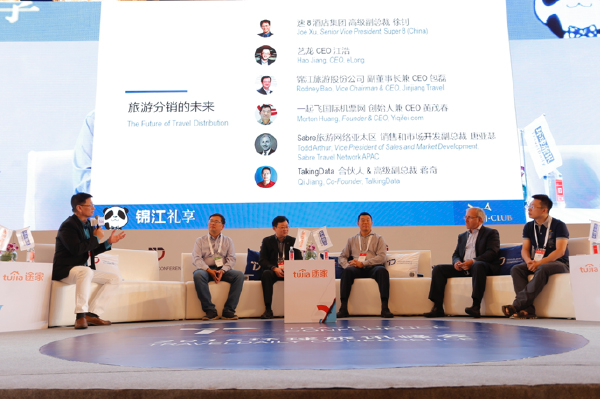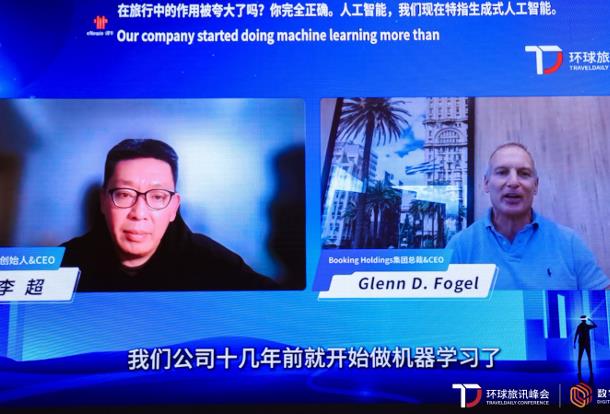ChinaTravelNews, Nicole Sy -The travel industry has continuously addressed the challenges of distribution with innovation, tech and consumer data. With those tools, its methods are becoming more efficient, though consumer behaviors are constantly evolving. Panel moderator Joe Xu, Senior Vice President of Super 8 China talks to an executive roundtable of distribution experts and veterans at the 2016 TravelDaily Conference, to get a better sense of the latest in distribution trends today.
On the panel are Hao Jiang, CEO of eLong; Rodney Bao, Vice Chairman & CEO of Jinjiang Travel; Morton Huang, Founder & CEO of Yiqifei.com; Todd Arthur, Vice President of Sales and Market Development for Sabre Travel Network APAC; and Qi Jiang, Co-Founder of research company, TalkingData.

Executive roundtable on "The future of travel distribution"
To first determine the trends in travel distribution, it is essential to look at changes in consumer needs and their booking behavior. It’s difficult to determine specific needs, according to eLong’s Hao Jiang. “For clients it’s very difficult to suggest one decision making model for travel since its very diversified,” he says. “There isn’t a one size fits all solution.”
“At Sabre, we’re thinking about how innovation is changing the travel experience,” says Arthur. “It’s an experience around what the traveler wants, which data and tech bring together. Not only do we improve distribution, but we bring data back to the clients we’re servicing, which will bring value.
People are looking for a more personalized experience, and the distribution part is taking that data and improving the travelers’ experience,” he says.
CEO of Jinjiang Travel, Bao sums it up in one word: customization. The large mass travel tour groups are happening less as more travelers prefer to travel on their own schedules and with their own agendas.
For a smaller company like Yiqifei.com, it’s more about their direct relationship to the travel destinations and consumers that is customized. “We developed an App called I Have Been There, where we require our employees to go to Bangkok, Singapore, and more, so they can experience these travels and make personal recommendations,” says Huang. “For example, if parents are traveling with a baby, what actions should they mimic and traps they might encounter to avoid?”
When it comes to sourcing that big data, Qi Jiang shares their methodology is standard, and while it doesn’t reveal everything about customer profiles, it is key in determining behavior in three steps. “First is the customer’s description. We have to have accurate understanding of who they are. Second, diagnosis: why certain types of people do certain things,” he says. Finally and importantly, is Data Prediction.
“When looking at travel, we work out the rationale for decisions backwards. We don’t just look at the hotel he booked, but why he booked the hotel. That’s why we offer unique data offering. If he has certain level of income, why did he book that? In the China market, for the individual, we have a compound and comprehensive profile,” explains Qi Jiang.
Global Distribution System company, Sabre designs their technology to bring data together, but roadblocks like privacy concerns still abound, according to Arthur. “We’re still at the stage where everyone is really protective of data, that makes sense. But what if we all move to another world where it’s OK? That’s what we’re working on, how can we get to a place where we can share this data?” he asks.
“With personalization and automation of this data, suppliers bring automation into their business, lower cost, reduce cost,” he explains.
“We are not using exactly big data, but we sit on a massive pool of customer data and in house data as well,” says Huang of Yiqifei.com. “The application of data is getting cheaper, cloud is easier to use and user-friendly,” he says.
The challenge is using it to get it touch with their customers, according to Huang. “How we scale the learning curve quickly so we can apply multiple IT solutions to match our intuition to quickly respond to the needs of customers.”
For traditional offline companies like Bao’s Jinjiang Travel, to access the data mine of knowledge means working together with companies like Sabre and TalkingData. “Online players, have the natural advantage because they sit on big data. For us, we do more analytics with our 170 million users of hotel business every year,” he says. “That’s why we need to have some cross fertilization with other companies as well. It’s about horizontal cooperation with other players. That way can extract best value out of customer base.”
Perhaps another large issue when it comes to technological innovation is artificial intelligence, or AI. However, according to the panel, there are still kinks to iron out before it can be fully integrated into the decision-making process and prediction for the travel industry.
“I believe that the general public still has a conservative idea of AI,” says Qi Jiang. “Maybe its not the right place in China, but in Western countries it’s already very popular. Globally speaking if they want to use AI for fully automated decision making, it cannot work. But if we want to define travel products better, the tech can grow to do it,” he says.
Hao Jiang of eLong also recognizes the opportunities and challenges that come with full automation. “IT tech theoretically can adjust this issue. This is also a self-learning curve,” he says. “But we don’t have to judge purely by data. People can help customize.”
Balance is fundamental though cost is a factor, according to Huang. “Travelers have individual needs, and at this point it’s very difficult to judge a person by big data, even AI, or maybe it’s too costly to do so,” he says. “I think we have to have the combination of human and machine in the next two to five years, though the financial cost is high.”
Whether through machines or humans, in the end, Arthur believes it still comes down to content. “Companies must ensure that they have the right content. If you don’t have the right content, it doesn’t matter how smart the machine is, it can’t offer anything it doesn’t have.”




